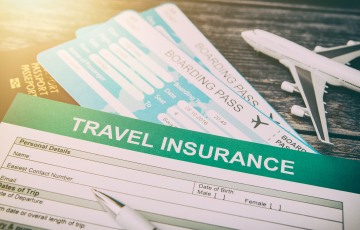How Do Travel Insurance Claims Work?
When the unexpected disrupts your journey, travel insurance becomes your safety net. But do you know how travel insurance claims actually work? In this guide, Travelner is here to help you understand the claims process as well as provide valuable tips to ensure your claims are successful.

To maximize your travel insurance claim, understand the claims process.
1. Understanding Travel Insurance Claims
Travel insurance claims refer to the process of seeking compensation from your insurance provider in the event of unforeseen incidents during your travels. These incidents can range from trip cancellations and delays to medical emergencies and lost luggage. Travel insurance provides financial protection and peace of mind. It ensures that you're not left shouldering hefty expenses when things go awry during your trip.
2. Types of Travel Insurance Claims
You can request compensation for everything specified in your contract. Here are some common types of compensation requests in any insurance policy:
|
Medical Expense Claims |
If you require medical treatment or hospitalization while traveling, you can submit a claim to cover your medical expenses. |
|
Lost or Delayed Luggage Claims |
If you lost, stolen, or delayed luggage, this type of claim helps you recover costs |
|
Travel Delay Claims |
If your travel plans are disrupted due to delays caused by airlines or other factors, you may be eligible for compensation. |
|
Trip Cancellation Claims |
If you have to cancel your trip due to unforeseen circumstances such as illness, accidents, or emergencies, you can file a trip cancellation claim. |
3. The Travel Insurance Claims Process
In this section, Travelner will guide you 7 steps in the travel insurance claims process. Moreover, it’s important to know that most travel insurance policies have strict time limits for filing claims, typically around 90 days. So, you need to submit your request within this allowable time frame.
Step 1: Review Your Policy
Before you embark on your trip, let’s take time to review your travel insurance policy and understand the coverage, limitations, and exclusions.
Step 2: Contact Your Insurer
In case of the event of a covered incident, contact your insurance provider as soon as possible. Their 24/7 emergency assistance service will guide you on the next steps and the information needed to file a claim.
Step 3: Collect Supporting Documents
To back up your claim, gather all the necessary paperwork, including receipts, medical records, and, if applicable, police reports or any other evidence of your expenses or losses.

Don't forget to gather all necessary documents before requesting a claim
Step 4: Complete Claim Forms
Most insurance companies will require you to fill out claim forms. Be sure to complete them accurately and provide all the requested information.
Step 5: Submit Your Claim
Send your claim along with the supporting documents to your insurer. Be prepared to provide additional information or answer questions if necessary.
Step 6: Wait for Evaluation
The insurance company will evaluate your claim to determine its validity and the amount of compensation you are eligible to receive.
Step 7: Receive Compensation
If your claim is approved, you will receive compensation to cover your eligible expenses or losses.The time it takes to receive the payout varies depending on the insurer and the complexity of your claim.
4. Why Travel Insurance Claims Get Delayed or Be Denied
Sometimes, your claim request may be denied or delayed, possibly falling into one of the following scenarios:
- Policy Exclusions: If your claim is one of specific exclusions listed in the terms and conditions, your request can be denied. So, make sure to check the policy carefully when claiming. Common exclusions include pre-existing medical conditions, high-risk activities, and certain destinations under travel advisories.
- Incomplete Documentation: One of the leading causes of claim delays is incomplete or missing documentation. Ensure you provide all necessary records to expedite the process.

Occasionally, your claim request may be denied or delayed.
- Investigations and Verifications: In some cases, insurers may conduct investigations or verifications before approving a claim. This can add time to the processing period.
- High Volume of Claims: During peak travel seasons or major global events, insurance companies may experience a surge in claims, leading to delays in processing.
>> Read more: How to get travel insurance claim approved?
5. Travel insurance claims advice from Travelner
To ensure a smooth claims process, it's necessary to keep in mind these advices:
- Keep Thorough Records: Maintain a record of all relevant documents, including receipts, medical reports, and communication with your insurer. This will facilitate the claims process.
- Contact Your Insurer Promptly: Notify your insurance provider immediately after an incident occurs. Delaying this step can result in complications during the claims process.
- Follow Instructions Carefully: Pay close attention to the instructions provided by your insurer. Any deviations from these instructions can lead to claim denials or delays.
6. Finding the Best Travel Insurance for Claims
Choosing the right travel insurance provider is a crucial decision, especially when it comes to ensuring a smooth claims process. But don’t worry, Travelner always beside you. With Travelner, you can enjoy quick and easy claims submission. In addition, our team is available to assist you, answer your questions, and guide you through the claims process at any hour.

Enjoy a quick and easy claims submission with Travelner.
In conclusion, understanding travelers insurance claim process is essential for a smooth travel experience. This article has provided valuable insights and tips to help you navigate the process effectively. By reviewing your policy, contacting your insurer promptly, and keeping thorough records, you can increase the likelihood of a successful claim. Choosing the right travel insurance provider, such as Travelner, can also simplify the process and provide essential support when needed. Travel insurance offers peace of mind, so being well-informed about the claims process is vital for your travels.
Explore tailored travel insurance and protect your trip now!
Related articles

Jun 26, 2024
Compare Annual Travel Insurance Plans: Find the Perfect Protection for Your Frequent Travels

Jun 20, 2024
Unpacking IMG Travel Insurance Reviews: Is It the Right Choice for Your Travel Needs?

Jun 19, 2024
Compare Travel Insurance Packages: A Comprehensive Guide

Jun 19, 2024







